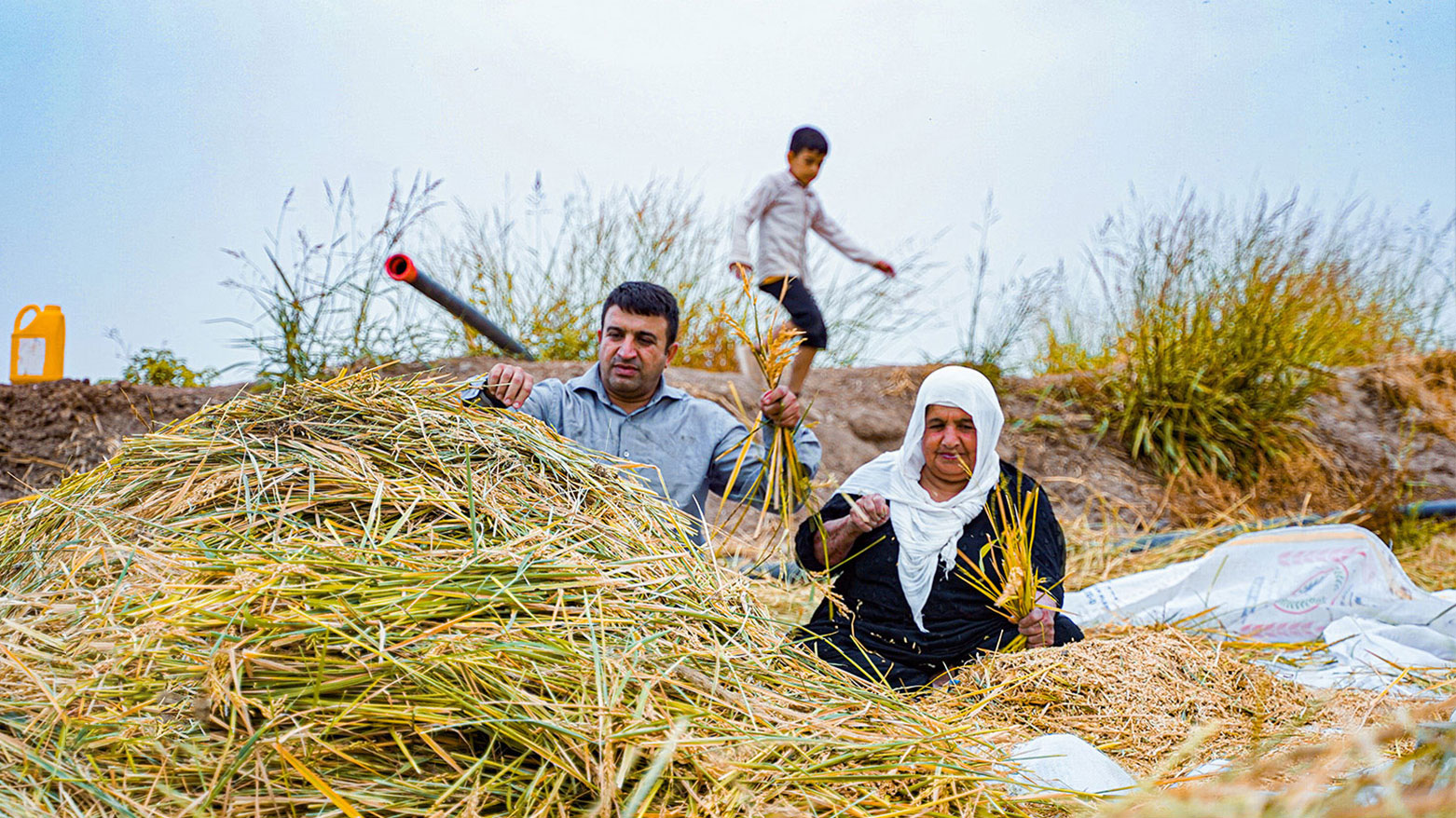Farmers in Kurdistan Begin Rice Harvest Season, Cultivating Tradition and Economic Growth
Farmers across the Kurdistan Region have begun the annual rice harvest, with Duhok alone producing an estimated 21,000 tons from over 21,000 dunams. The KRG is promoting agricultural exports as part of its economic diversification strategy, recently shipping Kurdish rice to international markets.

ERBIL (Kurdistan24) – As autumn descends upon the Kurdistan Region, farmers have begun harvesting their annual rice crops — a tradition deeply rooted in the region’s agricultural identity and a cornerstone of its evolving economic landscape.
Across Kurdistan’s fertile plains, expansive yards known as “Kharman” are prepared for the drying of freshly cut rice. Farmers gather with their families, spreading the grain beneath the sun for two to three days, allowing it to dry naturally before threshing.
Khalid Mohammed, a farmer from the Erbil countryside, explained to Kurdistan24, “We bring the rice we harvest here. This is a tradition in our village. After drying it, we use machines to thresh and separate it.”
Beyond its agricultural purpose, the harvest season embodies a spirit of community cooperation and social solidarity.
“This is an important and blessed place,” said Saman Chavshin, a local teacher who joins the harvest each year. “People help one another and support the poor. After the work is done, farmers often give part of their crop to families in need. Even those without land can come here and earn their livelihood. It’s better than being jobless.”
This year’s harvest is part of a broader agricultural awakening, particularly visible in Duhok’s Dereluk sub-district, where shimmering terraces of rice fields stretch across the valleys like a golden-green mosaic. The hum of modern harvesters now blends with the rhythm of traditional farming, symbolizing the union of heritage and innovation.
According to Ahmad Jameel, Director of Agriculture in Duhok, farmers in the governorate cultivated more than 21,000 dunams of land last year, producing an estimated 21,000 tons of rice. The region’s fertile soil has enabled the cultivation of several high-quality varieties, including Tahaluf and Kasandita, prized for their aroma and taste.
Research from Akre District, a hub of Kurdish rice production, indicates yields ranging between 860 and 1,200 kilograms per dunam. The rice is not only cherished across Kurdistan but is also in high demand throughout Iraq.
“Akre rice is always the most requested by customers,” said Nafkhosh Rashid, a local shop owner. “We sell it year-round and ship it to Erbil, Sulaimani, and Halabja.”
Tourists and residents alike praise the region’s signature grain. Mohammed Salah, a visitor to Akre, described the rice as “unparalleled in flavor,” while chef Kawar Sadiq noted that “90 percent of customers specifically ask for Kurdish rice with their meals.”
The Kurdistan Regional Government (KRG), under the leadership of Prime Minister Masrour Barzani, has placed agriculture at the heart of its economic diversification strategy, recognizing the sector as key to food security and sustainable growth.
Prime Minister Barzani has repeatedly emphasized that developing the agricultural sector is “the main foundation of a strong economy,” describing it as the “secret of Kurdistan’s success.”
Through initiatives such as the Kurdistan Agriculture Export Initiative (KAEI) launched in 2022, the KRG has worked to expand international markets for Kurdish products. Recently, 22 tons of food products, including Akre’s renowned rice, were exported to Sweden, with further plans to send rice, sumac, and tahini to the Gulf states.
Farmer Mahmoud Mohamad expressed optimism about these new opportunities: “Finding new markets benefits not only me but all Kurdish farmers. It means our work is finally reaching the world.”
This progress has inspired an agricultural renaissance across the region. In Amedi District, production of rice and sesame has doubled as more residents return to their farmlands, encouraged by government support.
Despite regional instability, farmers’ resilience continues to sustain growth and strengthen Kurdistan’s food sovereignty. As Prime Minister Barzani envisions, the goal is for the Kurdistan Region to become Iraq’s food basket, ensuring domestic sufficiency while promoting exports that showcase the quality of Kurdish products.
As the last rays of autumn sunlight fall upon Erbil’s harvest yards and Duhok’s golden paddies, the sight of full white sacks lining the fields tells a story beyond agriculture. Each bag represents a year’s perseverance, a community’s unity, and a government’s vision to transform fertile soil into the foundation of a prosperous, self-sustaining future.